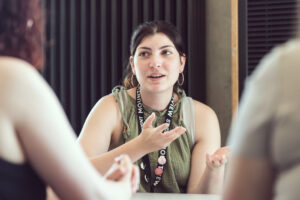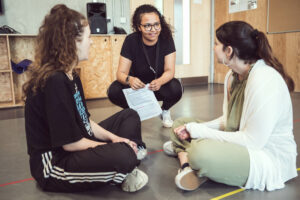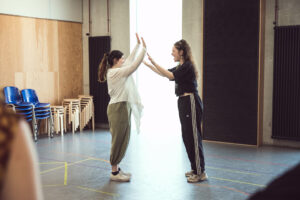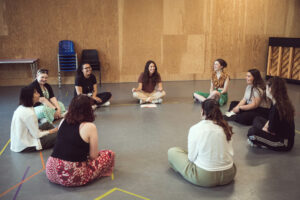Confronting Arts, Ethics and Economics with Theatre for Community and Education
Student Emily Rodríguez examines the interplay between the arts and capitalism, which is studied as part of Mountview’s MA Theatre for Community and Education. Emily is a second year MA Theatre for Community and Education student who specialises in facilitation and critical theory.
“As a second-year student at Mountview on MA Theatre for Community and Education (TCE), I am able to reflect on some truisms I held onto at the start of the course and track the various ways my studies have confronted them. Nowhere has this confrontation been more apparent than my views on work, money, and capitalism.
 The starving artist trope is present in the mind of any artist but for artists creating work on social justice, the trope is doubly pressing; if you really care for this cause and love your art form, won’t you work for free?
The starving artist trope is present in the mind of any artist but for artists creating work on social justice, the trope is doubly pressing; if you really care for this cause and love your art form, won’t you work for free?
Applied theatre, the umbrella term for socially and politically engaged theatre, is characterised by a belief in drama’s ability to do good. It would be easy for a course in this field to equip practitioners with the skills to do this work but without the critical understanding to decide whether they should. However, during my studies, I have found TCE to frequently and profoundly interrogate whether this work should take place, and under what conditions.
For instance, during one of our very first sessions, Arji Manuelpillai, who works with people who have been displaced, candidly shared his experience on a drama project which he later found ethically regrettable. He urged us to ask questions before getting involved with any project, and not position ourselves as inherent do-gooders. As students, we participated in numerous workshops which highlighted our relationship to money as artists, such as “Survival 101: An Artist’s Guide” by the performance artist, Andrea Spisto. In this session, we examined myths we held onto regarding money, from personal, to familial, to cultural. During another class led by our course leader María Askew, we practiced saying “no,” “yes,” and “maybe.” We further explored the balance between the courage to stand up for ourselves and consideration for others. Some other lectures delving into the crooks of capitalism and art were “Funding and Finance in Community Arts” with producer Patrick Collier and “Transforming Inequalities & Assessing Value in the Cultural Sectors” with the Head of Audience Development at Brixton House, Monique Baptiste-Brown.

In combination with our reading materials, it was evident that Askew was arming us with the skills to recognise exploitative work practices and fight burnout as an essential part of our training as applied theatre practitioners. Such reading materials included the work of W.A.G.E., Decolonizing Time by Nichole Marie Shippen, and “Make Art! Change the World! Starve!” by Yasmin Nair.
In specific, W.A.G.E is a non-profit “publicly calling [art institutions] out for exploiting unpaid labor while introducing tools to stop it and mobilizing people to use them.” In Decolonizing Time, we are confronted with the reality that active citizenship in arts and culture is frequently, and almost always, co-opted for passive consumption (2012).
Nair similarly examines our arts practices, citing funding models as a site of contention. Amid an extreme lack of public funding for the arts in the United States (the context Nair is writing from, as well as my home country), the burden of arts funding rests on the private sector. As Nair describes, private funders take on this role with an “aura of nobility,” without any demands to shift the burden of funding to the state and thus “[perpetuate] the very model of privatized funding that has caused our economic crisis in the first place” (2010).
 Nair even states that under this current model, “where artists are exploited by left neoliberals and where the politics of most arts/social justice projects are suspect,” social justice should not have a place in the arts. (Troubling for someone studying theatre for social justice, right?) I personally accepted that as an artist I should expect little compensation for my labour, holding fast to the idea that my work consists of “passion projects” and that “when you love what you do, you never work a day in your life.” Nair’s writing challenges this head-on, declaring that “it is hypocritical to place the burden of change on artists who are expected to perform change for little or nothing, while we allow for the defunding of the apparatus that should keep them alive.” Nair further advises us to stop asking the question “Are these projects going to change the world?” without asking “Are these projects fair and equitable and just in the way they treat artists as workers?”
Nair even states that under this current model, “where artists are exploited by left neoliberals and where the politics of most arts/social justice projects are suspect,” social justice should not have a place in the arts. (Troubling for someone studying theatre for social justice, right?) I personally accepted that as an artist I should expect little compensation for my labour, holding fast to the idea that my work consists of “passion projects” and that “when you love what you do, you never work a day in your life.” Nair’s writing challenges this head-on, declaring that “it is hypocritical to place the burden of change on artists who are expected to perform change for little or nothing, while we allow for the defunding of the apparatus that should keep them alive.” Nair further advises us to stop asking the question “Are these projects going to change the world?” without asking “Are these projects fair and equitable and just in the way they treat artists as workers?”
Not only are we taught that as artists we can and should ask for more, but as part of our coursework we are asked to practice this. For example, as part of our Business and Management module, we were tasked with applying for a mock Arts Council grant. One classmate, Becky Large, used the work she had done on the assignment to apply for actual funding. The project, named Drama Club London, uses drama to build connections and cultivate playfulness among adults. She was awarded funding and will be running workshops imminently.
 On the MA Theatre for Community and Education, we practice setting boundaries, are reminded that our art is indeed labour and critique the systems which undermine it as such. This big-picture examination offers a holistic education, one dedicated to uncovering the nuanced lives of artists that want to make a difference while having to work under capitalism.”
On the MA Theatre for Community and Education, we practice setting boundaries, are reminded that our art is indeed labour and critique the systems which undermine it as such. This big-picture examination offers a holistic education, one dedicated to uncovering the nuanced lives of artists that want to make a difference while having to work under capitalism.”
Sources:
Nair, Y. (2010) ‘Make Art! Change the World! Starve!: The Fallacy of Art as Social Justice – Part I’, Yasmin Nair, 12 August. Available at: https://yasminnair.com/make-art-change-the-world-starve-the-fallacy-of-art-as-social-justice-part-i/ (Accessed: 23 August 2023).
Shippen, N. (2014) Decolonizing Time: Work, Leisure, and Freedom. Palgrave Macmillan.
(No date) W.A.G.E. Available at: https://wageforwork.com/about#top.